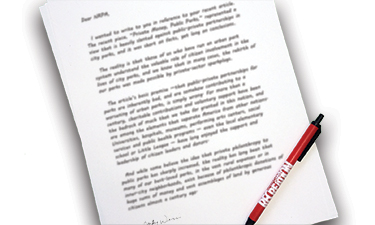 We hope the articles you read in Parks & Recreation are thought-provoking and engaging, and we want to hear your opinions on what you read in these pages. Through social media posts, website comments, emails to staff or posts on NRPA Connect, let us know how the magazine’s articles apply to your job and your agency.
We hope the articles you read in Parks & Recreation are thought-provoking and engaging, and we want to hear your opinions on what you read in these pages. Through social media posts, website comments, emails to staff or posts on NRPA Connect, let us know how the magazine’s articles apply to your job and your agency.
Before we can effectively partner with external entities, we have to get our own house in order! How do we ensure that new initiatives, innovations and tools don’t fall flat? How do we seed a culture of openness, excellence and accountability? How do we become the change we want to see, together? The answer is clear. Transparent, authentic and genuine communication is essential to building accountability and openness. Staff can truly benefit from discussing key strategies, techniques and methodologies that foster honesty, genuine communication and authenticity in highly bureaucratic systems. So how do we accomplish that seemingly monumental task?
One tool that change agents could deploy is the development of a robust professional learning community. Professional Learning Communities (PLCs) are groups of practitioners that meet regularly, share knowledge and expertise, and work collaboratively to learn, grow and improve overall effectiveness. PLCs provide practitioners a forum to celebrate successes, challenge assumptions, innovate and collaborate. A robust PLC can burst through silos, create new avenues for professional exchange and, in my opinion, increases overall job satisfaction.
As a member of the Weikart Center for Youth Program Quality’s Field Consultant Team, I participate in a robust PLC. We meet on a webinar monthly that is co-facilitated by different team members each time. Topics are chosen by us for us. The conversations are grounded in strong content and allow ample time to discuss implementation and also provide a healthy dose of reflection at the conclusion of the meetings. I always leave the discussions feeling reenergized, reinvigorated and ready to hit the ground running with lessons learned. It also inspires this question, “If I can have such a great learning community experience with nine other professionals from around the United States, why can’t I have the same experience with the people in the cubicle or office next to me?” The truth is, I can. Someone has to step up and take the leadership role and make the time and space to leverage the genius in each of us. Are you ready to be that person?
Finally, it is worth mentioning another powerful unifying force that fosters collaboration: Shared purpose. Purpose is the end or result at which an entire organization is aimed. I once read an article titled, “The Power of Purpose,” by Susan Gross. After reading it a few times I learned how shared purpose can become a unifying force that tears down walls and breaks through silos, creating a climate of excellence that embraces change as an opportunity rather than something to be feared or avoided. Gross describes purpose as being “always inspiring” and that it should motivate and unify staff. If it does not then something is off.
I can’t tell you how many times in my career that I felt like something was off but could never pinpoint why. It is so much clearer to me today. It is important for me to know that I am working with and for people that share a similar passion for the mission, and they are willing to roll up their sleeves to put in the right amounts of sweat equity and effort to actualize our purpose.
Email from Brodrick Clarke, education and policy coordinator with the Prince George’s County Department of Parks and Recreation, regarding the importance of educational collaborative groups. Learn more about NRPA’s online community of park and recreation professionals, NRPA Connect.

